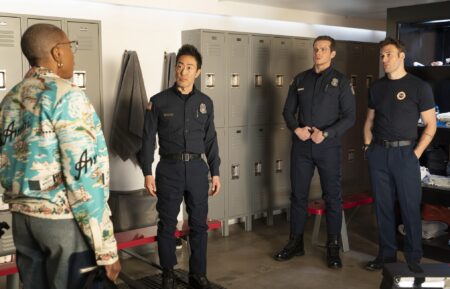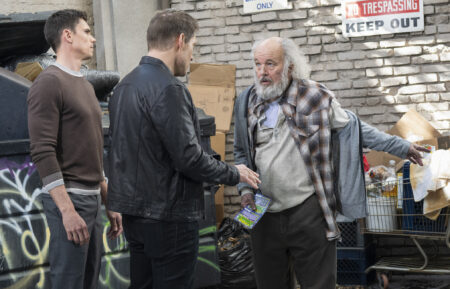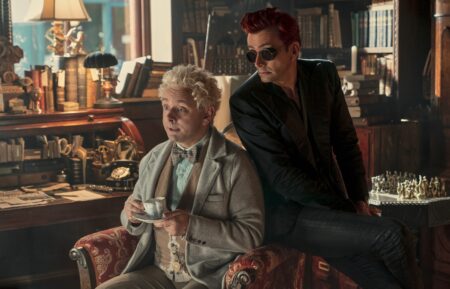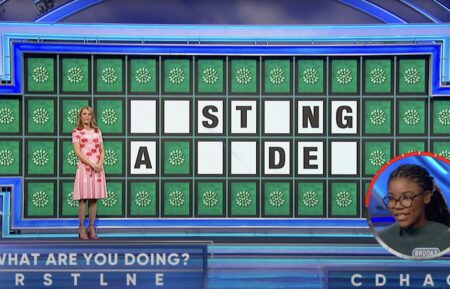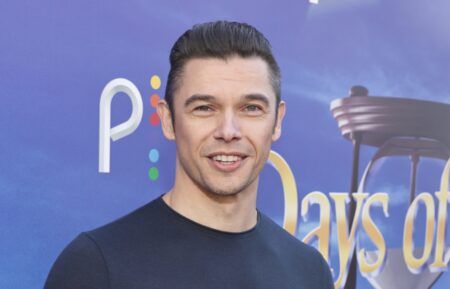What to Expect for the Rest of This ‘Unmissable’ Season on ‘Blindspot’
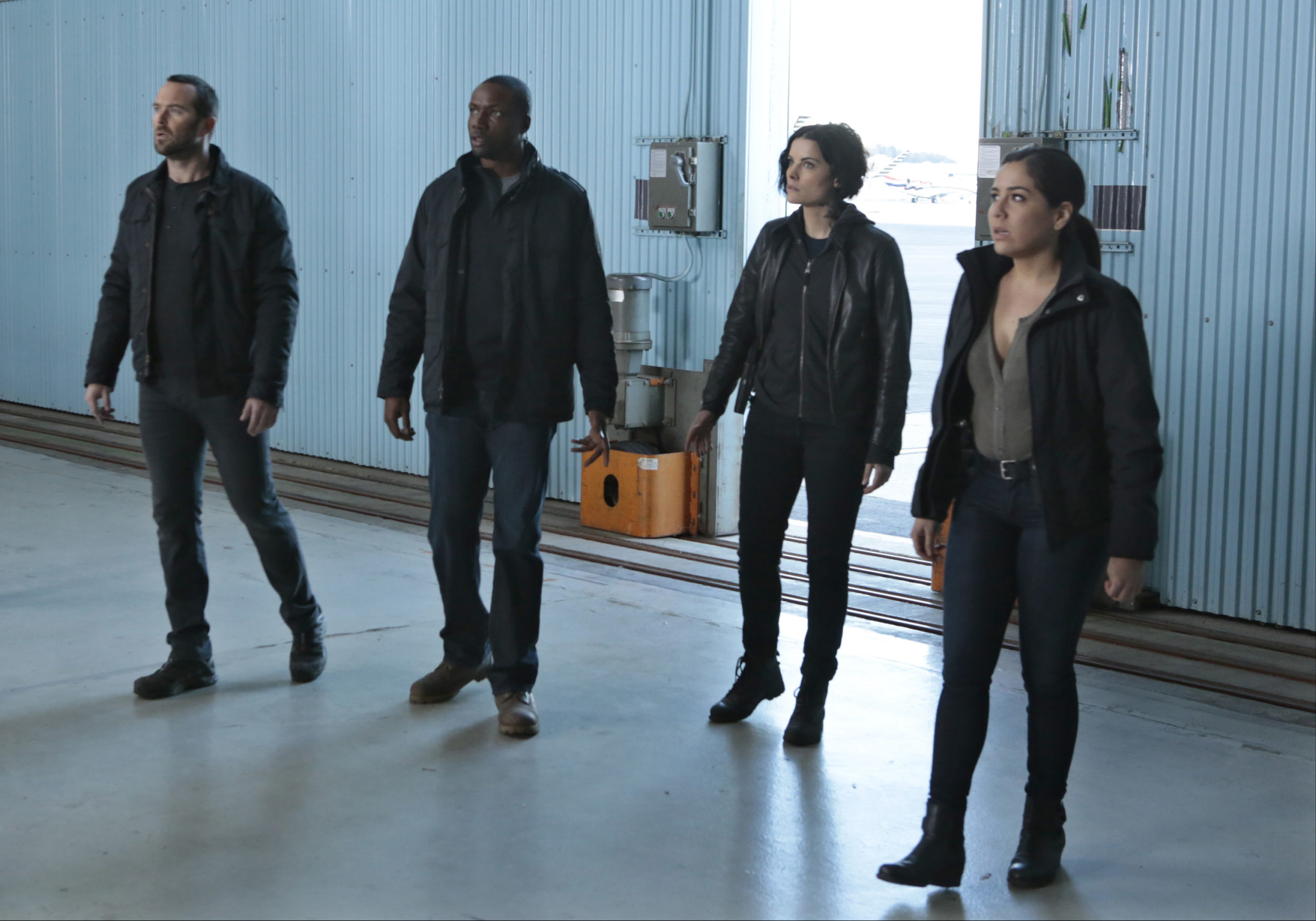
Spoiler alert! Don’t read further if you haven’t watched the newest episode of Blindspot.
At the end of Monday night’s midseason premiere of Blindspot, Jane Doe (Jaimie Alexander) had a tough choice—meet up in the park with her FBI comrade/beefcake-in-residence Weller (Sullivan Stapleton) or head to a sketchy rooftop to get details about her screwed-up life from Oscar (Francois Arnaud). She chose the latter, and now her world is turned upside down as she tries to figure out who the real good guys are. We caught up with showrunner Martin Gero to break down the premiere and tease what’s ahead.
Why did you decide now to reveal that Jane Doe is Taylor Shaw?
Oscar realizes he can’t just give her nothing. He’s got to give her things of consequence for trust to start to build between the two of them. So he feels like that’s a pretty tame piece. I’ve said from the beginning [though], even if she was Taylor Shaw, where has she been for the past 25 years? Taylor Shaw is just the beginning of the story. The fact that she was this missing girl, who took her, and what happened in the intervening years? Why has she chosen to tattoo herself and erase her memory? Those are the giant questions of the show.
Should we then take Oscar at face value?
I don’t think you should take anyone on the show at face value. [Laughs] The only one that is totally pure from the audience’s POV is Jane now. Everybody else has ulterior motives. But again, I think Oscar really needs to give Jane concrete pieces of herself so that she can start to trust him.
This revelation that it’s all Jane’s plan—what is that going to mean for her moving forward? Is she going to be questioning everything around her?
I think so. I mean, it’s a real emotional mind f—k because the people that she’s closest to now are the ones that she’s there to deceive suddenly. So she realizes that she’s a Trojan horse amongst her friends, and it can’t help but give her pause in those relationships. Now the tough part is they’re really her family. They’re really the only people she really trusts, and she’s being told that she shouldn’t by somebody she also doesn’t trust. So what was very black and white for Jane, she’s entering some emotional murky waters. What was great about Jane’s character in the beginning was she was experiencing everything in lock step with the audience. We were finding out everything when she was, but on a show that’s kind of a thriller, she didn’t have any secrets. She didn’t have any ulterior motives to play. So now she’s gotta wrestle with the moral ambiguity of like, “Well, do I tell them, or is that bad? I don’t even know who I am. Would I be arrested immediately if I told them?”
These little missions that Oscar is proposing, how are they going to affect the format of the show? Will they be part of the framework around the procedural elements?
Yeah, I think what’s great about the back half of the season is, because we’ve gotten the character and mythology stuff in such a great place—I hope—we’re able to give it more screen space. So the procedural aspect will always be a part of the show. But you’re able to interweave it with other bigger pieces of the mythology like her little tasks, her missions. But occasionally they’ll take over the show.
How long did Weller wait in that park? I mean, is he still there now?
[Laughs] Weller’s there right now. It is 15 days later. He is hungry and cold. Um, [no], I don’t think he waited that long. We deal with that immediately in Episode 12.
In the plane, was Jane really going to tell Weller that she chose this life too?
Yeah, I think they’re about to die, [and] she wanted it off her chest. He feels such guilt about bringing her into these situations, and I think she would have told him that she did this to herself.
Is that because she still feels romantically about him?
Absolutely. I mean, I think she feels very connected to him. But again, it’s got her all twisted. She doesn’t really understand what the scenario is and how dangerous it’s going to be for Weller. She wants to put some distance between them for his own protection, not because she doesn’t like him anymore.
In terms of Patterson (Ashley Johnson), moving forward, how will you balance letting her character grieve and deal with the aftermath of David’s (Joe Dinicol) death, but also retaining her as the comic relief in the show?
We’re choosing our moments really carefully. The good thing for the show and the bad thing for Patterson emotionally is, she’s really going to bury herself in work and pretend like nothing is wrong. That will be successful for a little bit, but his passing is something that she’s going to deal with in various ways through the back half of the season. But it doesn’t mean that suddenly we have a down and dour Patterson. It was a tough balance for us. Even when I was writing Episode 11, I had to walk back some of the jokes that Patterson had. Because you’re like, “Yeah, I mean, he just died. I don’t think she’s back to this.” She makes a joke about the pieces of pie and the number pi. Even that is just half-hearted, like her own brain’s on autopilot a little bit. But no, I think her wit and vitality is a big, important part of the show, and I think we’re able to have our cake and eat it too.
RELATED: How Ashley Johnson Steals the Scenes on Blindspot
Is she officially suspended or did Mayfair (Marianne Jean-Baptiste) save her?
No, she is not suspended. Mayfair basically says by the end of the episode, “I need her and if that’s a problem, take it on me.” But that gives the John Hodgman character [Fischer] the ammunition he needs to start trying to wedge Mayfair out.
So Fischer’s going to be around awhile?
He’s going to be around for more than this episode, yeah.
How is the back half of this season most different from the first?
Let me break it down into three things. One, just production wise, the first season of a show is so chaotic and crazy, even for us polished professionals. Learning how to make the show is a learning curve, so I think the back half of the season production, value wise, we’ve just really figured out how to maximize our time and our money to really make the shows feel enormous. So that’s super exciting. Two, I think the show’s grown out into an ensemble character drama now. In the beginning, really the only two people we were invested in were Weller and Jane. Now, Patterson can take up a lot of screen time, sometimes Zapata (Audrey Esparza) can take up a lot of screen time, Reade (Rob Brown) and Mayfair… It’s filling out into an ensemble show, which just allows us to tell bigger and better stories. And then most importantly, suddenly your lead character is potentially the bad guy. She’s trying to reconcile that with who she is now—the stuff that made her do the stuff that she did versus the moral compass that she feels now. It’s a fascinating thing for a character to play, and I think we get a lot of mileage out of it.
What is one question that viewers have now that the show will answer before the end of the season?
Here’s the thing, by even saying it, it’s a huge spoiler. You know what I mean? If I was like, “It answers this question,” you’d be like, “IT DOES?!” And then you’d be like, “I didn’t even know that was a question!”
Give me one word to describe the rest of the season.
Unmissable.



